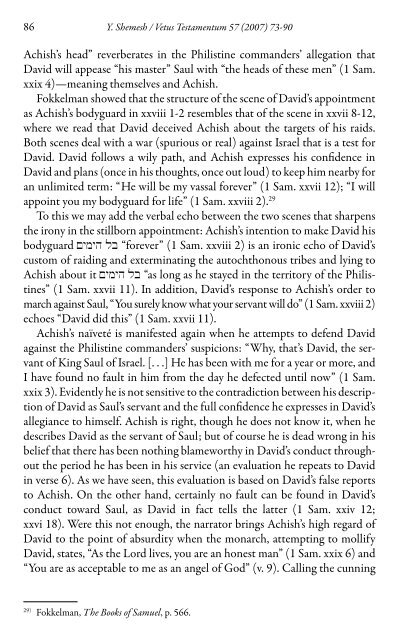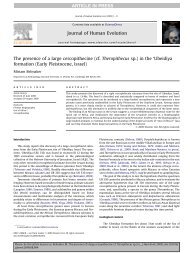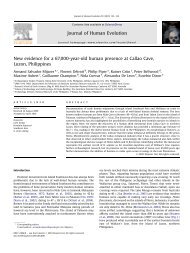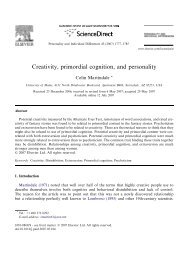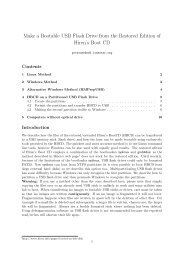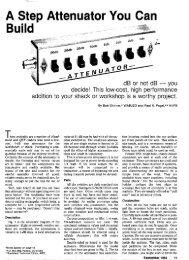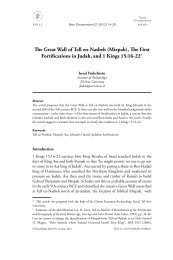David in the Service of King Achish of Gath: Renegade to His ...
David in the Service of King Achish of Gath: Renegade to His ...
David in the Service of King Achish of Gath: Renegade to His ...
Create successful ePaper yourself
Turn your PDF publications into a flip-book with our unique Google optimized e-Paper software.
86 Y. Shemesh / Vetus Testamentum 57 (2007) 73-90<br />
<strong>Achish</strong>’s head” reverberates <strong>in</strong> <strong>the</strong> Philist<strong>in</strong>e commanders’ allegation that<br />
<strong>David</strong> will appease “his master” Saul with “<strong>the</strong> heads <strong>of</strong> <strong>the</strong>se men” (1 Sam.<br />
xxix 4)—mean<strong>in</strong>g <strong>the</strong>mselves and <strong>Achish</strong>.<br />
Fokkelman showed that <strong>the</strong> structure <strong>of</strong> <strong>the</strong> scene <strong>of</strong> <strong>David</strong>’s appo<strong>in</strong>tment<br />
as <strong>Achish</strong>’s bodyguard <strong>in</strong> xxviii 1-2 resembles that <strong>of</strong> <strong>the</strong> scene <strong>in</strong> xxvii 8-12,<br />
where we read that <strong>David</strong> deceived <strong>Achish</strong> about <strong>the</strong> targets <strong>of</strong> his raids.<br />
Both scenes deal with a war (spurious or real) aga<strong>in</strong>st Israel that is a test for<br />
<strong>David</strong>. <strong>David</strong> follows a wily path, and <strong>Achish</strong> expresses his confidence <strong>in</strong><br />
<strong>David</strong> and plans (once <strong>in</strong> his thoughts, once out loud) <strong>to</strong> keep him nearby for<br />
an unlimited term: “He will be my vassal forever” (1 Sam. xxvii 12); “I will<br />
appo<strong>in</strong>t you my bodyguard for life” (1 Sam. xxviii 2). 29<br />
To this we may add <strong>the</strong> verbal echo between <strong>the</strong> two scenes that sharpens<br />
<strong>the</strong> irony <strong>in</strong> <strong>the</strong> stillborn appo<strong>in</strong>tment: <strong>Achish</strong>’s <strong>in</strong>tention <strong>to</strong> make <strong>David</strong> his<br />
bodyguard μymyh lb “forever” (1 Sam. xxviii 2) is an ironic echo <strong>of</strong> <strong>David</strong>’s<br />
cus<strong>to</strong>m <strong>of</strong> raid<strong>in</strong>g and exterm<strong>in</strong>at<strong>in</strong>g <strong>the</strong> au<strong>to</strong>chthonous tribes and ly<strong>in</strong>g <strong>to</strong><br />
<strong>Achish</strong> about it μymyh lb “as long as he stayed <strong>in</strong> <strong>the</strong> terri<strong>to</strong>ry <strong>of</strong> <strong>the</strong> Philist<strong>in</strong>es”<br />
(1 Sam. xxvii 11). In addition, <strong>David</strong>’s response <strong>to</strong> <strong>Achish</strong>’s order <strong>to</strong><br />
march aga<strong>in</strong>st Saul, “You surely know what your servant will do” (1 Sam. xxviii 2)<br />
echoes “<strong>David</strong> did this” (1 Sam. xxvii 11).<br />
<strong>Achish</strong>’s naïveté is manifested aga<strong>in</strong> when he attempts <strong>to</strong> defend <strong>David</strong><br />
aga<strong>in</strong>st <strong>the</strong> Philist<strong>in</strong>e commanders’ suspicions: “Why, that’s <strong>David</strong>, <strong>the</strong> servant<br />
<strong>of</strong> K<strong>in</strong>g Saul <strong>of</strong> Israel. [. . .] He has been with me for a year or more, and<br />
I have found no fault <strong>in</strong> him from <strong>the</strong> day he defected until now” (1 Sam.<br />
xxix 3). Evidently he is not sensitive <strong>to</strong> <strong>the</strong> contradiction between his description<br />
<strong>of</strong> <strong>David</strong> as Saul’s servant and <strong>the</strong> full confidence he expresses <strong>in</strong> <strong>David</strong>’s<br />
allegiance <strong>to</strong> himself. <strong>Achish</strong> is right, though he does not know it, when he<br />
describes <strong>David</strong> as <strong>the</strong> servant <strong>of</strong> Saul; but <strong>of</strong> course he is dead wrong <strong>in</strong> his<br />
belief that <strong>the</strong>re has been noth<strong>in</strong>g blameworthy <strong>in</strong> <strong>David</strong>’s conduct throughout<br />
<strong>the</strong> period he has been <strong>in</strong> his service (an evaluation he repeats <strong>to</strong> <strong>David</strong><br />
<strong>in</strong> verse 6). As we have seen, this evaluation is based on <strong>David</strong>’s false reports<br />
<strong>to</strong> <strong>Achish</strong>. On <strong>the</strong> o<strong>the</strong>r hand, certa<strong>in</strong>ly no fault can be found <strong>in</strong> <strong>David</strong>’s<br />
conduct <strong>to</strong>ward Saul, as <strong>David</strong> <strong>in</strong> fact tells <strong>the</strong> latter (1 Sam. xxiv 12;<br />
xxvi 18). Were this not enough, <strong>the</strong> narra<strong>to</strong>r br<strong>in</strong>gs <strong>Achish</strong>’s high regard <strong>of</strong><br />
<strong>David</strong> <strong>to</strong> <strong>the</strong> po<strong>in</strong>t <strong>of</strong> absurdity when <strong>the</strong> monarch, attempt<strong>in</strong>g <strong>to</strong> mollify<br />
<strong>David</strong>, states, “As <strong>the</strong> Lord lives, you are an honest man” (1 Sam. xxix 6) and<br />
“You are as acceptable <strong>to</strong> me as an angel <strong>of</strong> God” (v. 9). Call<strong>in</strong>g <strong>the</strong> cunn<strong>in</strong>g<br />
29) Fokkelman, The Books <strong>of</strong> Samuel, p. 566.


